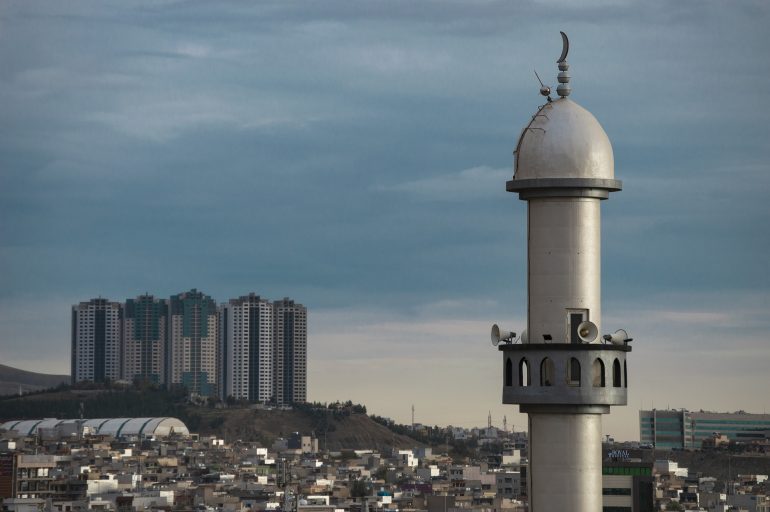A suspected Turkish drone attack targeting Mazloum Abdi, the General Commander of the Kurdish-led Syrian Democratic Forces (SDF) and key partner of the United States, near Sulaymaniyah International Airport has raised security alarms in the Kurdistan Region, with partisan squabbles becoming more evident among the governing political parties.
Despite initially being played down by SDF Head of Media Centre Farhad Shami, Mazloum Abdi later confirmed and condemned the drone attack on Twitter, saying that Turkey’s violations in Iraq and Syria have profound security implications in the region.
Shami later confirmed that Abdi was in Sulaimaniyah during the attack but has since returned “unharmed [to] the secure areas of north and eastern Syria.” They added that they “deliberately restricted the release of information about the Turkish attack on Sulaymaniyah airport.”
In an email to the Wall Street Journal, spokesperson for US Central Command, Colonel Joe Buccino, stated, “I can confirm that there was a strike on a convoy in Sulaymaniyah, Iraqi Kurdistan Region. That convoy included US military personnel. There were no casualties.”
Turkey has not admitted to the attack which has laid bare an increasingly hostile relationship with the PUK. Ankara’s Foreign Ministry on April 5th confirmed its airspace had been closed for flights that land and take off from Sulaymaniyah International Airport since April 3rd. The statement added that “the decision was taken upon the intensification of [Turkey’s Kurdish rebel] Kurdistan Workers’ Party (PKK) terrorist organization’s activities in Sulaymaniyah, infiltration by the terrorist organization into the airport and thus threatening of flight safety.”
In 2019, the PUK sought to mend its soured relations with Turkey by shutting down offices of PKK-affiliated parties in Sulaymaniyah. This time, it’s the PUK’s burgeoning relationship with the SDF in Turkey’s crosshairs.
Late last year, party leader Bafel Talabani visited Syria for meetings with Mazloum Abdi. Talabani released a video on his social media page, emphasizing pan-Kurdish nationalist sentiments.
But the unease lurched into uncharted territory last month as a helicopter crash in the KRI’s Duhok Province killed nine fighters of the SDF. The passengers belonged to the SDF’s Anti-Terrorism Units (YAT) and included the unit’s commander. They allegedly used choppers the PUK’s Counter-Terrorism Group (CTG) provided.
Turkey, viewing the SDF as an extension of the PKK, has expressed concerns about the SDF’s presence in the KRI. Talabani dialed into this year’s Kurdish New Year celebrations in Turkey to call for “the release of our Kurdish leaders,” a not-so-veiled reference to the imprisoned PKK leader Abdullah Ocalan and former People’s Democratic Party (HDP) co-leader Selahattin Demirtas.
The drone attack by Turkey has ignited partisan outrage within the Kurdistan Regional Government (KRG). KRG spokesperson Jotiar Adel released a statement expressing concerns about the situation and accusing the PUK of misusing government institutions.
In response, KRG Deputy Prime Minister Qubad Talabani, a member of the PUK, denounced the drone attack by Turkey. The dysfunction at the heart of Kurdistan’s governing structures was underscored when the KRG’s deputy PM made the astonishing claim that the KRG spokesperson does not represent the entire government but only speaks for the KDP.
PUK leader Bafel Talabani and the party’s politburo also released statements strongly condemning the attacks and accusing KDP security and intelligence services of assisting Turkey.
Iraq’s President Abdul Latif Rashid, a long-time member of the PUK, also condemned the attack and demanded Turkey apologize for hostile behavior on the country’s soil. Former Minister of Interior and incumbent National Security Advisor Qasim al-Araji visited the site in Sulaymaniyah to deliver a report to Prime Minister Mohammed Shia al-Sudani.
Intriguingly, the Kurdistan Region Presidency, led by KDP deputy leader Nechirvan Barzani, issued a separate statement from the official KRG press release. This statement called on ruling parties to refrain from blaming each other and to exercise restraint during the ongoing investigation. The statement also emphasized that the security and stability of the entire region, particularly Sulaymaniyah, are top priorities for the governing institutions. This departure from the KRG statement highlights a clear contrast in the KDP’s approach: Prime Minister Masrour Barzani’s faction is more hostile toward the PUK, while President Nechirvan Barzani’s faction leans toward reconciliation. This distinction underscores the longstanding differences between the two deputy leaders and cousins.
Change Movemnt (Gorran), a former opposition party now part of the governing coalition, issued a statement urging official institutions to take all necessary measures to protect peace, security, and stability in Sulaymaniyah and the wider Kurdistan Region.
Sulaymaniyah Governor and Gorran member Haval Abubakir denounced the attack, highlighting the escalating partisan conflicts between the KDP and PUK. He encouraged both parties to resolve their differences and prevent the Kurdistan Region from becoming a casualty of their partisan conflicts.
The New Generation Movement (NGM), the largest opposition party in the Kurdistan Region, downplayed the severity of the escalating KDP-PUK disputes over the drone attack. They even questioned the motives behind these conflicts, suggesting that they serve to delay the upcoming Kurdistan Region parliamentary elections, in which the ruling parties are expected to lose seats due to their poor governance performance. As the regional parliament of Iraqi Kurdistan has extended its term by an additional year, the NGM now considers the governing institutions to be expired and has instructed its MPs to resign from parliament.
The Kurdistan Communities Union (KCK), the umbrella organization of the PKK, released a statement condemning Turkey for the drone attack and accusing the KDP of complicity. Similar to statements from PUK figures, the KCK questioned the KRG’s official account and used quotation marks around the KRG spokesperson’s title. The KCK’s statement also claimed that the “KDP targets every Kurd who does not surrender to the Turkish state and encourages the Turkish Republic.”


